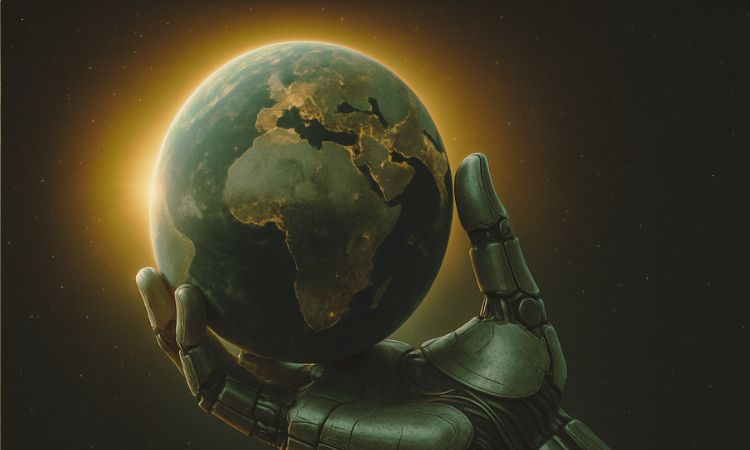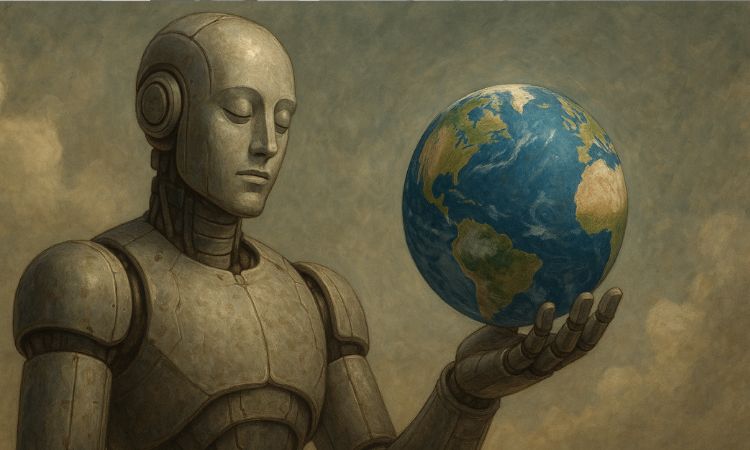
In a very long (almost two hours) and interesting conversation, The CEO of Google Suendar Pichai He reviewed with the popular podcaster and researcher in the Lex Fridman his vision of the world, technology and leadership. The dialogue reveals to a reflexive manager, away from the stereotype of aggressive CEO, and deeply engaged with the impact that technology has on humanity. In addition, it leaves very striking conclusions about its vision of a world that is changing radically through AI.
Since Fridman has done us the favor of publishing the transcription of the interview (thanks!) We have taken the opportunity to review it in depth and extract the most relevant to our sector. Let's go there 😉
A quiet leader in turbulent times
Pichai starts defining its leadership style: listening more than you speak, seeks to understand before imposing, and values continuous learning as a growth engine. “Being a good listener is an important part of leadership”he explained. In an environment like Google, where thousands of people work on deeply complex projects, their role is not to always have the answers, but ask the right questions.
The CEO confesses that many important decisions require patience, and that its usual process is to absorb as much information as possible before deciding. This management philosophy, based on intellectual humility, is also reflected in its vision of AI.
Asked for his famous tranquility and balance when directing, pichai gives free rein to Your most human part:
«I get angry. I get frustrated. I feel the same emotions as all at work and in everything. But over time, I discovered the best way to get the most out of people. You find people with a clear mission, who share the same path, who have an inner impulse towards excellence to do their best. Motivates people and you can achieve a lot that way. It usually works like this.
But have I lost my head sometimes? Yes. Maybe less frequently than others, and perhaps with the years less and less, because I have discovered that it is not necessary to achieve what one needs ».
AI as a revolution beyond technology
Few phrases better summarize the thought of sundar pichai than is: “Artificial intelligence is the deepest technology in which humanity is working. I have always said that it is deeper than fire or electricity”. Far from an effective metaphor, what it raises is a radical change that will mark a before and after in the history of mankind.
As he explains, the AI not only allows automating tasks or generating text, but also has the ability to Learn to learnsomething that distinguishes it from any previous innovation. “What surprises me is how it improves for itself. That introduces a completely new dynamic, ”he says.
Pichai acknowledges that we are still in the first steps of this transformation, but argues that its impact will be transversal: from the way people interact with knowledge to how the global economy is structured. And that is where the digital sector is already seeing the first tremors.
«In Google about 30% of the code uses suggestions generated by AI. But the most important metric, and we measure it carefully, is how much engineering speed has increased thanks to AI. It is a difficult measurement, and we treat it rigorously. Throughout the company, We have achieved a 10 % increase in engineering speed through AI, but We plan to hire more engineers next year, because the margin of opportunities of what we can do is also expanding. “
Towards the general AI?
In the interview, Losco Pichai addresses the debate on the AGI (general artificial intelligence) with caution but without detracting from progress. Although he does not believe that we reach the AGI in 2030, he anticipates “dramatic” advances that will deeply transform society. He even introduces the concept of AJI (artificial Jagged Intelligence), a current phase in which the AI impresses with its abilities but still fails in trivial tasks.
«Today there are moments like when one is sitting on a waymo (an autonomous taxi) on a street in San Francisco, between the crowd and people, and makes its way; I see flashes of it. The car is sometimes impatient, trying to break through Gemini Live or asking questions about the world ».
For Pichai, rather than looking at a specific date, the essential is prepare for the deep implications of this technological evolution which will undoubtedly mark the next decade in multiple dimensions.

How AI is redefining the experience of searching online
One of the most relevant issues of the interview is the change of paradigm in the way we use tools such as Google's search engine. Pichai introduces the concept of Ai overViews, The functionality with which Google is promoting the generative Search Experience (SGE). For Pichai this new experience does not eliminate the classic link list, but The recontextualizes: Above a summary created by AI appears that helps the user quickly understand the most relevant information about their search.
He explained that the evolution of the search is constant. The design objective is for users to obtain “a lot of context” but also “find many things on the web”. This will be maintained in the newly announced AI and the IA overviews.
Is Google considering a permanent “AI” mode? Although pichai does not use that term, it does admit that In the future there will be contexts in which users prefer to interact with conversational agents In a more sustained way: “I think there will be experiences in which people interact with an AI prolonged. But I also believe that other times they will simply prefer a traditional search.”
That is, for Pichai we do not walk towards an environment in which the AI replaces the traditional digital experience, but complements it and expand it.
Regarding advertising, Pichai indicated that in the initial stage of the AI mode they will focus on “organic experience” and suggested that AI will help determine the best way to integrate ads, Maybe explaining the commercial information in a new way. He acknowledged that the underlying need for people to value commercial information and companies connect with users does not change with the arrival of AI but are open to rethink their lace.
On whether the IA mode will replace the classics of 10 blue links plus the incorporation of the Overview, Pichai replied that the current plan is that The AI mode is a “separate tab for people who really want to experience that.” He affirmed that, as the characteristics work, they will continue to migrate to the main page. ” That is, over time, as Google perfects the functionalities of the IA mode and see which are successful and useful for users, those proven and polished characteristics could be incorporated into the main search experience (the page we see normally when searching).
Despite the whole AI, Pichai assures that A fundamental objective of Google is that AI continues to direct users to the information and content that has been created by people on the web. This is crucial to support content creators and prevent AI becoming a “black box” that only generates their own answers without reference to the original sources.
Pichai also addressed the concerns of content creators, stating that it helps to “deliver higher quality references” where people have “much more likely to find what they are looking for.” He indicated that people are “exploring,” “curious” and their intention is satisfied “more.” He concluded by saying that “news and journalism will play an important role in the future” and that Google is “quite committed to it”
Towards an agentic website
Pichai explains that he believes that in the future they will live Two different websites: the traditional or human and the agriculturewhere AI agents will have the greatest prominence and will be responsible for solving tasks for humans. Something that goes in the line of Google's advances around Project Mariner:
«Today, not everyone does it, but you go to a large store, you love to travel the halls, you love to go shopping or the supermarket, choose the food, etc., but also buy online and they make you deliveries at home, right? So both are complementary, and that applies to restaurants, etc. So I think that, over time, websites will also improve for humans. They will have a better design. AI could, in fact, design them better for humans.
So I hope the web becomes much richer, more interesting and easier to use. At the same time, I think there will be an agentic websitewhich is also progressing a lot, and you have to solve the commercial value and the incentives for it to work well, right? So that people participate in it.
But I think both will coexist, And obviously, agents may not need the same … they will not need the same design or the same user interface paradigms that humans need to interact. But I think both will be there ».
Risks, ethics and the challenge of governance
In parallel to enthusiasm, Pichai does not ignore the risks. He speaks openly about the challenge that this technology represents ethically, from biases to misinformation, through the possible impact on employment. “We have to make sure that AI is developed in a responsible way. That is why we established our principles of the IA on Google,” he says.
The solution, he says, cannot be left alone in the hands of technology companies: “The risks are too high for this to solve only companies. We need strong institutions, global cooperation and a real commitment to doing the right thing. ”
Democratize AI: a historical responsibility
Pichai also insists on the need for prevent the IA from extending existing inequalities. He remembers his childhood in Chennai, India, and how he had his first phone at age 14. That experience marked his vision of technology as an inclusion engine: “Technology is a great equalizer. It has the power to give access to anyone.”
Therefore, one of Google's great efforts is to adapt its models of AI to contexts of low technological access, translate content to less represented languages and develop tools that work even with limited resources.
AI and productivity: a new knowledge revolution
On the economic level, Pichai is clear: IA will transform the work of knowledge. “AI can help you start, edit, think faster. release time for you to concentrate on what really matters”Instead of replacing humans, he believes that smart systems will work as co -pilotsincreasing efficiency and redefining what tasks provide value.
This will affect designers, programmers, analysts and creatives, and will open new possibilities for the development of software and content, on an unprecedented scale and speed.
The future, between amazement and responsibility
At the end of the conversation, Lex Fridman asks if technology can get away from the human. Like Pichai responds with optimism, in an answer that summarizes all its philosophy:
“Am optimistic And, if we consider the journey of human civilization, we see that we have improved the world tirelessly in many ways. At any time, there are big problems to solve, but I always wonder: would you have been born now or at any other time in the past? I would almost always prefer to be born now. And that is the extraordinary achievement of human civilization: we have constantly made the world a better place. And something tells me that, as humanity, we always rise together to boost that border. So I hope it is not different in the future »
Image: Chatgpt




